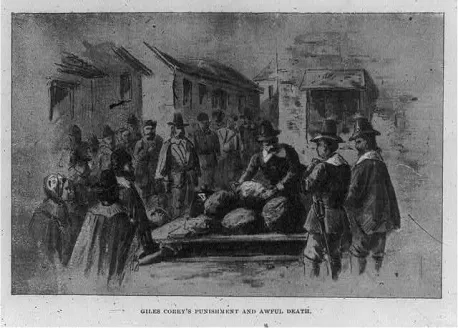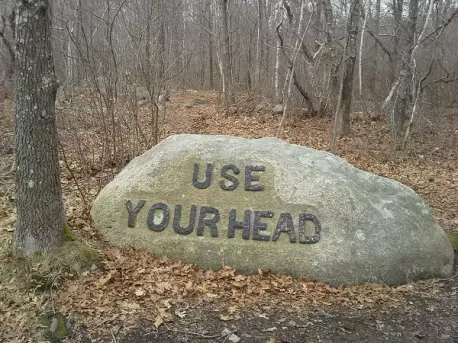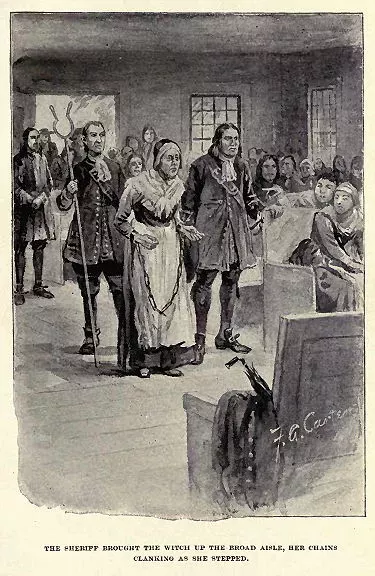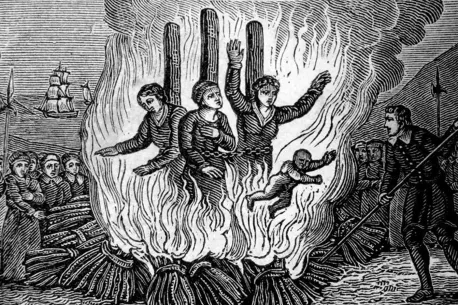2. The Curse of Giles Corey. Giles Corey was an elderly farmer accused of witchcraft in 1692. He refused to enter a plea and was subjected to peine forte et dure, a gruesome torture in which he was crushed under heavy stones. He famously responded to calls for a plea by saying, "More weight," and cursed his tormentor, Sheriff George Corwin, and the city of Salem. Legend claims his ghost roams the Howard Street Cemetery, and sightings are said to portend disaster for the town. According to Nathanial Hawthorne, a Salem resident for parts of his life, and who wrote somewhat extensively on the town, "at stated period, the ghost of Giles Corey the wizard appeared on the spot where he suffered, as the precursor of some calamity that was impending over the community, which the wizard came to announce." One would assume, after his treatment in Salem, announce rather gleefully. The ghost was spotted in 1914 shortly before the great fire of Salem, which started on Gallow's Hill and destroyed a third of the city. It has been said that Giles' curse toward the sheriff has been effected as well. Some have waken to a strange presence in their bedroom, with a suffocating weight on their chest. An unusually high number have died from heart attacks or been taken from office due to heart problems. A monument now stands in his honor in Salem. Have you've heard of this tale?

3. The Ghosts of Proctor's Ledge. The spirits of the 19 executed victims are said to haunt the site, which was officially identified as Proctor's Ledge in 2016. Apparitions, disembodied screams, and strange lights have been reported, as well as the ghost of the "hanging judge" John Hathorne, who sentenced many to death. Essentially its the ghosts of the women who perished due to being accused of "witchcraft" There is a great article I will post here, but have you've seen this site before? https://moonmausoleum.com/the-haunting-legacy-of-the-salem-witch-trials-gallows-hill-and-old-burying-point/

4. The witches of Dogtown. In the woods between Gloucester and Rockport lies Dogtown, a colonial settlement that became a refuge for social outcasts, including widows and freed slaves, in the late 1700s. The area's ominous name derives from the semi-feral dogs that lived there. However, a more sinister tale claims that a werewolf also haunts the area, with reported sightings since the 1800s. Locals in nearby towns believed these eccentric women were witches. The "witches" of Dogtown embraced this reputation, making a living by telling fortunes and threatening to curse travelers who did not pay them. Here is an interesting blog about the town with much more historic information about it. But have you've ever explored this old settlement? https://historyofmassachusetts.org/the-witches-of-dogtown/

5. Rebecca Nurse was an elderly, pious, and highly respected member of the community when she was accused of witchcraft at the age of 71. This made her one of the most unlikely and notable victims of the trials. She was primarily accused by Ann Putnam Jr., who alleged that Nurse's "specter" or ghost had attacked her. During her trial, Nurse was initially found not guilty by the jury. However, the accusers in the courtroom erupted in renewed fits and screams. Under pressure from the judges and the public, the jury was asked to reconsider. A single, misunderstood remark from Nurse, who was hard of hearing, was used to change the verdict. Nurse was executed by hanging on July 19, 1692. After dark, her family secretly retrieved her body and buried it on the family homestead, since those executed were denied a Christian burial. Her execution fueled public protests against the trials. Today, her memory is preserved at The Rebecca Nurse Homestead in Danvers. The property includes her preserved 17th-century home and the family cemetery where her family is believed to have buried her. It serves as a tangible reminder of the Salem Witch Trials and the injustice that she and many others faced. Have you've heard of this lady?

6. After everything that has happened during the trials. Do you believe they were really about witchcraft or putting outspoken women in their place?

COMMENTS


